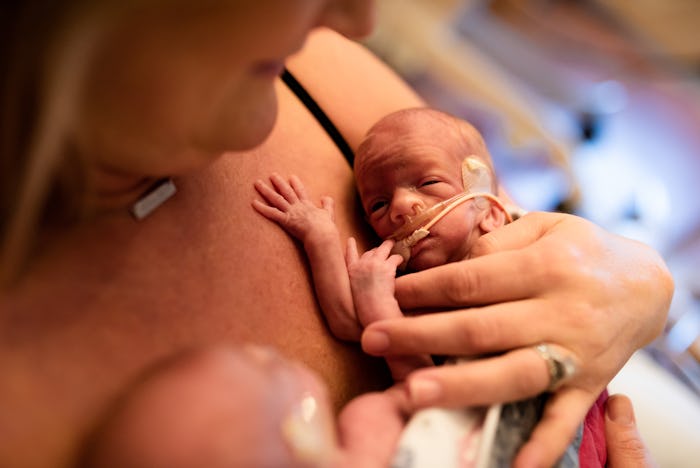Twin Parents

Here’s The Average NICU Stay For Twins, According To Experts
The idea of NICU time can be scary, but experts say your babies are in good hands.
The topic of birth for twin moms is a loaded conversation. You’ve already had to mentally double everything, but making it to your due date with two healthy babies becomes your primary concern even before your belly begins to round. Weaved into that is wondering if your babies will need time in the neonatal intensive care unit (NICU) and, if so, what is the average NICU stay for twins. While every parent's experience is different (all twins don’t have to go to the NICU), with pregnancy you always want to err on the side of preparation.
“Around one in four twins get admitted to the NICU. That’s two-and-a-half times the rate of all babies,” says neonatologist Kevin Kathrotia M.D.
Having an idea of how long twins stay in the NICU can help settle your concerns, and you can develop a plan for what you’ll need during this time. The length of your twin’s NICU stay will depend on your baby's health condition and the reason(s) for neonatal care.
Two neonatologists share insight on what to expect.
Reasons twins get sent to the NICU
The most common reason twins are sent to the NICU is for prematurity, according to neonatologist Dr. Pam Griffiths M.D.
“Many twins are born in the late preterm category, 34 to <37 weeks gestation,” Griffiths says. At these gestational ages, their bodies haven’t fully developed, causing some issues that make time in the NICU necessary. She says common problems include:
- Hypoglycemia — when the body has low blood sugar or glucose, which is its primary energy source
- Difficulty regulating their temperature — because of a lack of body fat
- Jaundice — a condition causing yellowing of the skin and eyes because the baby’s liver isn’t mature enough to get rid of bilirubin (yellow pigment of red blood cells) in the bloodstream.
- Difficulty feeding — usually due to an underdeveloped digestive system
In the NICU, they receive care as they continue to grow and any medical assistance necessary to address these health issues.
“These infants may receive care in a warmer bed or isolette, receive IV fluids with a sugar source, and receive instruction on feeding and oral or nasal tube feeds while gaining feeding skills,” Griffiths, who specializes in neonatal care, says. She adds that it’s common for these babies to receive routine blood tests and need phototherapy treatment for jaundice.
Average NICU stay for twins
The length of stay varies for each baby based on their condition, and one determining factor is how premature they are. Before your baby can go home, they must reach certain vital milestones.
“The baby needs to be able to eat and grow on their own without additional oxygen or breathing assistance,” Griffiths says. Whether or not your baby can do this depends on how developed their body is. “More mature babies can achieve these goals faster.”
Based on the weeks of gestation your twins are born, here’s how long the experts say their NICU stay could be:
- Babies born before 34 weeks may go home closer to their original due date, especially if they have needed higher degrees of support in the NICU.
- If they’re born at 34 to 35 weeks, they may need to stay in the NICU for two weeks.
- Twins born 35 to 37 weeks may stay a week or less.
“We aim to send babies home when the medical team feels they can thrive in the care of their parents without the need for medical intervention,” Griffiths says.
In the few moments that you can’t be by your babies’ sides, Griffiths offers a bit of reassurance. “The nursing and medical staff caring for babies in the NICU have a passion for taking care of babies, no matter what their condition, and will be there to support you and your babies.”
There’s a lot, emotionally and physically, that goes into taking care of your twins during a NICU stay, but you should take care of yourself too. “Make sure you enlist help from friends and family with things like cooking meals and watching the older kids,” Kathrotia says. So, while you’re showing up for your babies in this sensitive time, let your village show up for you.
Experts:
Kevin Kathrotia M.D., neonatologist, NICU director and COO of Millennium Medical Group
Pam Griffiths M.D., neonatologist at Phoenix Children’s
This article was originally published on